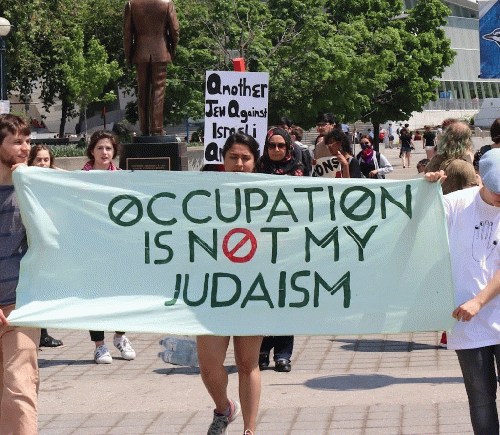Not my Judaism
"There is nothing so whole as a broken heart."
Last week (2021-11-04), Independent Jewish Voices (IJV - Canada) presented a webinar ("From IDF to IJV") telling the story of three Jewish members who were former Israeli Defence Force (IDF) participants, but over the years and through similar yet varying experiences, ended up working with IJV Canada.
The host for the show, Aaron Lakoff, indicated IJV's "uncompromising solidarity" with the struggles of the Palestinian people for humanitarian rights and civil equality in Palestine, in essence all of historical Palestine. IJV was one of the first organizations in Canada to recognize and support the BDS campaign. In summing up the overall aspect of a person's recognition of having been lied to by family, government, and mainstream society, a reference from the radical Jewish writings of Kokzter Rebbe was made, "There is nothing so whole as a broken heart." It's meaning did not really strike until I heard the three histories "From IDF to IJV."
Narrative
All three participants tended to have similar yet varying experiences, the main commonality to start was their secular Judaism, with their religion of being Jewish replaced with the religion of Zionism. Participation in the IDF was assumed and was a course of action supported by much propaganda. It was an army like no other, the most moral army in the world.
The host for the webinar Lia Tarachansky, indicated the army has changed in three significant ways: first, the majority of effort put into Unit 8200, the Army Intelligence Unit and its massive surveillance and hasbara efforts; next she mentioned the increasing use of a "remote control" army, using modern AI and robotics to challenge any created enemy; and - most surprisingly, although in line with U.S. efforts perhaps not - the privatization of army functions in an attempt to absolve the government of responsibility for blame.
Realizations
While accepting their involvement with the IDF at first, over time - sometimes rapidly - the IDF members became more and more disillusioned with the IDF and with Israeli policy in general. For Daphna Levit, a Mizrahi Jew, the military as presented in schools, was "always something we looked up to" and the role of the IDF was a "glorious, heroic effort" to the degree that it was "good to die for the country" - God had become Zion. Her function in the 1967 war was to escort media personnel to different war zones, and in the process, "create a narrative" that was different from what she saw. In particular she mentioned watching as Palestinian refugees were crossing the Allenby Bridge into Jordan, watching a scene her delivered narrative did not describe accurately.
Yom Shamash ventured to Israel in 1971, feeling "confident" in Israel, and that it was at peace as Egypt was "neutralized." Describing himself as "a terrible soldier" he was posted in the Sinai Desert when the Yom Kippur war took "everyone by surprise" and he indicated "my unit was decimated". He began to question the sense of it all, asking "what did they die for...sand?" It struck home harder when he learned that Golda Meier had rejected Anwar Sadat's desire for peace talks. Previous to that, during his training, he recalled being out on night patrol training, and became aware that the funny feeling under his boots came from "stepping on vegetables" - their training had trampled on Palestinian gardens.
Arriving a touch later, Rafi Silver emigrated to Israel in 1971 and settled into a Kibbutz (where the soldiers "were revered") in the Golan Heights. From a strong Zionistic family, he was "caught up in army myths" and had his beliefs "chipped away by reality." When deciding where to enlist, the common theme was "how to get into the most elite" units; it was a sign of shame to not prove yourself. He got over that within the first fifteen minutes of basic training.
(Note: You can view every article as one long page if you sign up as an Advocate Member, or higher).





